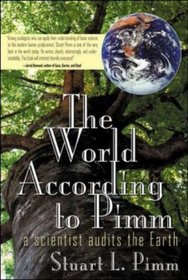Search -
The World According To Pimm: A Scientist Audits the Earth
The World According To Pimm A Scientist Audits the Earth
Author:
Ever since the publication of Rachel Carson's Silent Spring in the '60s, we've known that human activity has had detrimental effects on the environment. Yet after four decades of growing awareness of environmental problems, we still see passionate disagreement between activists and business interests over what should be done. Much of the impasse... more »
Author:
Ever since the publication of Rachel Carson's Silent Spring in the '60s, we've known that human activity has had detrimental effects on the environment. Yet after four decades of growing awareness of environmental problems, we still see passionate disagreement between activists and business interests over what should be done. Much of the impasse... more »
ISBN-13: 9780071374903
ISBN-10: 0071374906
Publication Date: 7/20/2001
Pages: 304
Rating: 1
ISBN-10: 0071374906
Publication Date: 7/20/2001
Pages: 304
Rating: 1
2 stars, based on 1 rating
Genres:
- Science & Math >> Earth Sciences >> Environmental Science
- Science & Math >> Earth Sciences >> Geology
- Engineering & Transportation >> Professional Science >> Earth Sciences >> Environmental Science
- Engineering & Transportation >> Professional Science >> Earth Sciences >> Geology
- Outdoors & Nature >> Environment >> Conservation
- Outdoors & Nature >> Environment >> Ecology





